Let’s talk about the storage, shelf life, and spoilage of coconut oil.
So you’ve found a jar that’s a couple of weeks (or months) past its date, and you’re wondering: does coconut oil go bad?
Or maybe you’ve just opened a fresh one, and you’re wondering how long coconut oil lasts or what’s the best way to store it.
Sounds familiar? If so, this article is what you’re looking for.
Let’s get right into it.
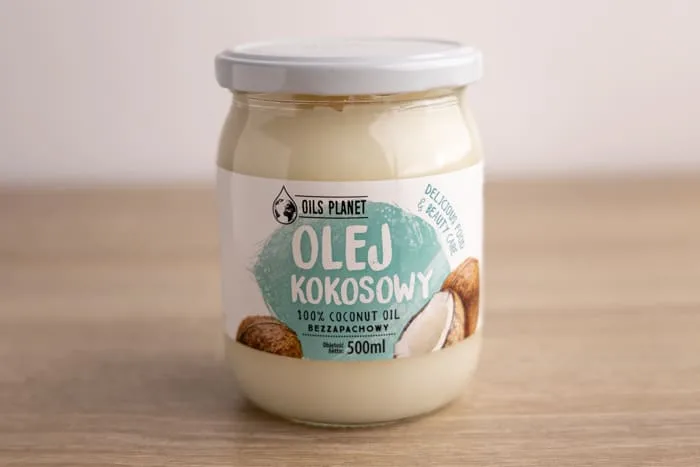
Table of Contents
- Does Coconut Oil Go Bad?
- How to Tell if Coconut Oil Is Bad?
- Is Melted Coconut Oil Still Good?
- How Long Does Coconut Oil Last?
- How To Store Coconut Oil
- Does Coconut Oil Need to Be Refrigerated?
- Coconut Oil Shelf Life and Expiration Summary
Does Coconut Oil Go Bad?
Coconut oil goes bad if stored for too long or in poor conditions. The most common way it spoils is by going rancid. You can tell your oil is rancid if it tastes sharp or bitter, or smells like old paint or nail polish remover.
Besides that, there are a couple of other spoilage signs that we’ll discuss in a second.
Now, eating or cooking with a bit of rancid coconut oil won’t make you sick immediately. So there’s no need to worry if you tasted yours and it turned out rancid.
But eating it regularly has potential negative long-term consequences, so it’s best to toss it.
Now, before we talk about signs of spoilage, check your jar to learn if your coconut oil is refined or not (often labeled “virgin”). They smell and taste different, which is essential when checking yours for spoilage.
Got it? Let’s move along.
Extra virgin and virgin coconut oil are the same thing. The word “extra” doesn’t change anything in the context of coconut oil.
How to Tell if Coconut Oil Is Bad?
Discard coconut oil if:
- Its color has changed. Liquid coconut oil is clear, while solid is white (like milk). When it melts and goes solid again, it turns creamy (see below). But if yours turns yellow or even darker, get rid of it.
- It smells rancid. For starters, you should know that virgin (unrefined) coconut oil has a nutty, coconut-like smell. On the other hand, refined coconut oil has a pretty neutral scent (that’s why it’s often used in cooking). If yours smells different, especially bitter, sour, paint-like, or reminds you of chemicals, the oil is rancid, and it has to go.
- It tastes bitter or sharp. Again, virgin coconut oil has a light coconut flavor, while the refined variety doesn’t have much of a taste. If yours taste kind of sour, bitter, or sharp, it’s no good.
- It has black spots or any other organic growth. If you notice any signs of organic growth, either on the surface or floating around when the oil is liquid, it’s best to discard the fat. If your oil is exposed to mold spores enough times, it could grow mold.
If something else that doesn’t fit the typical signs pops up, go with your gut and follow the “better safe than sorry” advice.
If you’re not sure that old coconut oil is still safe to eat, maybe it looks a bit off or smells weird, assume that it’s gone bad. Or use it in one of the many other ways you can use coconut oil outside cooking.
Next up, let’s talk about melted coconut oil.
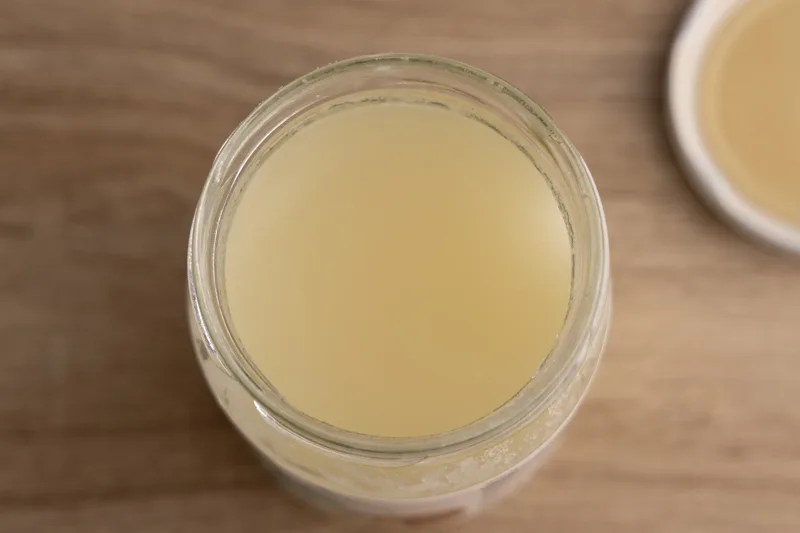
Is Melted Coconut Oil Still Good?
Coconut oil that has melted, or melted and solidified again, is still safe to use. That’s true even if that has happened multiple times.
Also, there’s no nutrient loss in the process, so you don’t have to be concerned if you open your kitchen cupboard in the middle of a sweltering day and find your coconut oil melted.
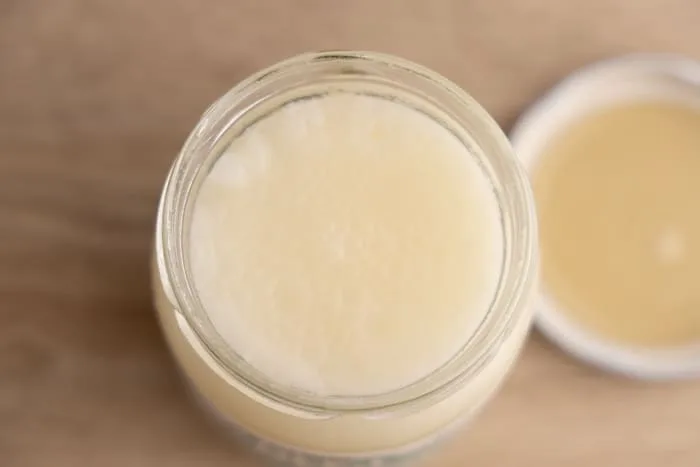
If you prefer your coconut oil to stay solid (or liquid), you can adjust for that by changing where you store it. I talk about it in detail in the storage section.
Last, coconut oil isn’t the only fat that melts and solidifies when the temperature changes.
The same happens to bacon grease. Or there’s olive oil, which is usually more viscous in the fridge than it is at room temperature. There are also butter, lard, and margarine that all melt on the stove. The only difference is the temperature.
If you’re curious what temperature is needed to melt coconut oil, the answer is 75°F (or 24°C). That’s why when you keep it in the kitchen, it usually turns into liquid only in the middle of the summer and solidifies after only a couple of days of slightly colder weather.
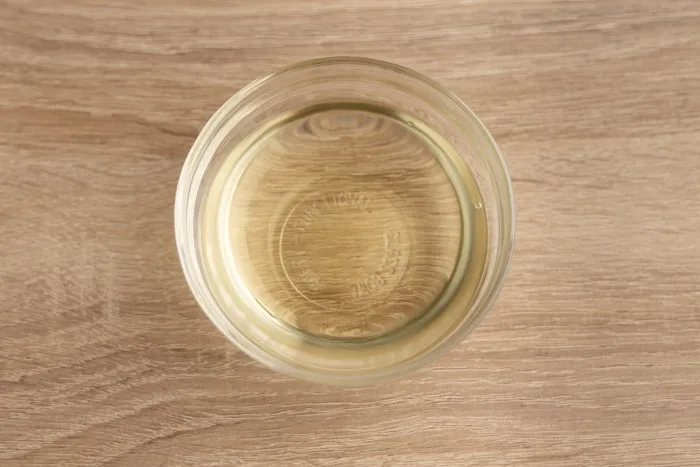
How Long Does Coconut Oil Last?
Coconut oil lasts one to two years and retains quality for at least a couple of months beyond the printed date if you store it properly.
Opening the jar for the first time doesn’t affect the shelf life that much. Sure, it exposes the oil to fresh air, which might speed up the rancidification process a bit, but that’s not a big deal. Unless you leave the jar unsealed for a prolonged period, of course.
In case you were wondering, there’s a difference in shelf life between refined and virgin coconut oil. The latter tends to last longer than the former, but there’s no consensus on how long each one is good for.
In other words, each brand has its own set of recommendations.
That said, refined coconut oil lasts about 2 years, while virgin (unrefined) keeps for approximately 3 years. But I’ve also seen sellers claiming their virgin coconut oil (or VCO) lasts up to 5 years, so there’s that.
For me, the easiest way to go about that is to start with the date on the label, assume that the oil should keep for a few extra months, and always check if it’s still okay before using.
It’s a simple system, but it works.
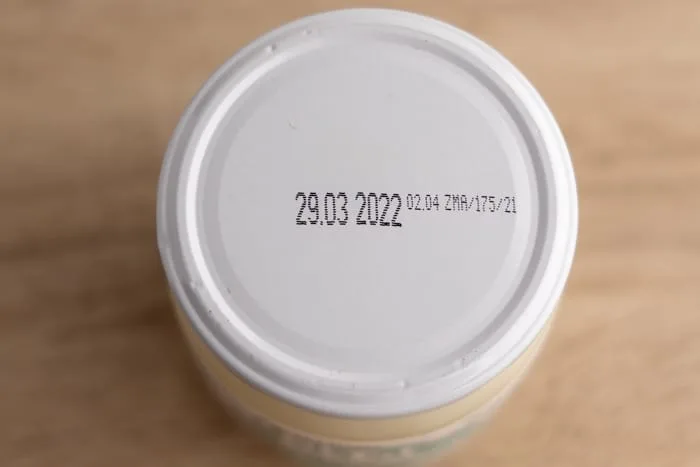
Expired Coconut Oil
Coconut oil doesn’t expire, at least not based on the date printed on the label.
The date on the jar of coconut oil isn’t an expiration date but rather a best-by or best-if-used-by date. It’s an estimate related to food quality, not food safety.
In other words, it doesn’t imply that once the oil reaches that date, it’s no longer safe to consume.
Having that out of the way, you might be wondering how long after the “expiration” date coconut oil is good for. Unfortunately, there’s no good answer here.
It all depends on the quality of the oil itself and how well you store it. But even if you follow all the rules to a T, I cannot guarantee you anything.
Your coconut oil should retain quality for at least a couple of months past its date. That’s the best I’ve got. Sometimes it’s going to be a month, other times half a year or even more. That’s just the nature of the beast.
The bottom line is: check your coconut oil for spoilage signs, and if there are none, continue using it.
How To Store Coconut Oil
You can store coconut oil in a kitchen cupboard at room temperature, in the pantry, or even refrigerate it. Make sure the oil is sealed tightly in its glass jar, the temperature is fairly stable, and it’s away from direct sunlight and heat sources.
The glass jar coconut oil usually comes in is perfect for long-term storage. There’s no need to transfer the oil into a more suitable container upon opening.
Like all other oils, proper food hygiene is crucial for coconut oil to last as long as possible. That includes:
- sealing the jar right after scooping the amount you need
- always using clean spoons and never double-dipping
Following those practices ensures you don’t accidentally introduce any mold spores or other contaminants into the jar.
When it comes to where the jar should sit, it all depends on whether you prefer to have it liquid, solid-but-scoopable, or plain solid.
To have it liquid, you should keep it somewhere warm, like maybe on top of your hot water heater. For the intermediate state, where the oil is solid but you can scoop it easily, keep it in a cool cupboard in the pantry or kitchen. If you want it to be super solid, go with the fridge.
You can quickly melt coconut oil in a warm bath. Scoop as much as you need into a bowl, and place that bowl in another bowl filled with hot water. Warm tap water works too, though a bit slower.
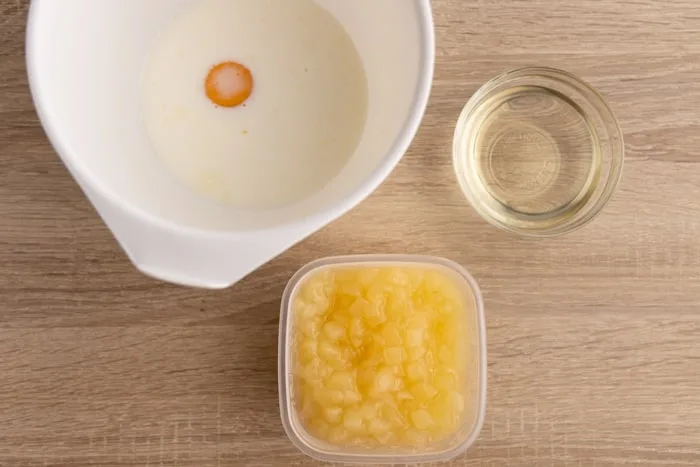
Does Coconut Oil Need to Be Refrigerated?
There’s no need to refrigerate coconut oil. Neither an unopened jar nor one that you just opened requires refrigeration.
You can refrigerate it if you prefer the oil to be solid and quite firm, or want to prolong its storage time, but those are the only reasons to do so. Otherwise, just stick it in a cupboard that doesn’t get too hot in the summer.
For me, I store coconut oil in a cupboard in the kitchen, where it stays solid but scoopable for most of the year.
The oil melts whenever there are two or more consecutive days of hot weather in the summer, and I’m fine with it. It gets back to solid after a couple of colder days.
Coconut Oil Shelf Life and Expiration Summary
Thanks for reading this primer on coconut oil. Here are the takeaways:
- Coconut oil goes rancid if stored for too long or in poor conditions. Yours is rancid if it tastes sharp or bitter, or smells like old paint or putty.
- Coconut oil lasts about 1 to 2 years and typically keeps for at least a couple of months past the printed date. Virgin coconut oil tends to retain quality longer than its refined counterpart.
- Store coconut oil in a cool and dark place, away from heat sources. And make sure it’s sealed tightly when not in use. Refrigeration is optional, and worth considering if you need the oil to last a really long time, or it’s super hot in your kitchen and you tend to store all your oils in the fridge anyway.